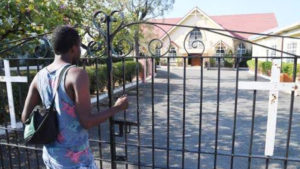 PRIME Minister Andrew Holness yesterday announced that, effective Monday, March 8, no funeral services or burials will be allowed to take place in the country until the measures are reviewed on March 22.
PRIME Minister Andrew Holness yesterday announced that, effective Monday, March 8, no funeral services or burials will be allowed to take place in the country until the measures are reviewed on March 22.
The measure is part of efforts to slow spread of the novel coronavirus, which up to yesterday had killed 417 people locally of the 22,817 cases recorded since March last year. Of that number 13,318 have recovered.
“We have to take this drastic action because we do not see any willingness on the part of our brothers and sisters — not everyone, because some people do comply — but we are seeing a significant level of non-compliance in this area,” Holness told a press briefing last evening at Jamaica House.
“We have given a directive to the municipal authorities that no burial orders should be issued.”
Holness said that funeral services that were already scheduled for March 1 to 7 will be allowed to proceed, but under the strict guidelines of the existing measures, which only allow for 15 people, inclusive of members of the clergy.
At the same time, a three-week ban has been placed on in-person worship services with more than 10 people, including ministers, the praise and worship team, musicians and tech people to facilitate online streaming.
Holness said he has not yet had a chance to officially meet with church leaders, but he has been communicating with them and they indicated that they would cooperate with the new directives.
“Our churches have, by and large, followed the rules. I am very satisfied with the leadership that our churches have shown,” said the prime minister.
Wedding ceremonies, however, have been spared, but with their number of total attendees cut in half.
“So, only 25 persons, including the bride, groom, pastor and two witnesses [are allowed to be physically present],” he said. “I am sorry to do this, but for the next three weeks this is what we will have to do.”
When asked why weddings were allowed to continue while burials and funeral and worship services have been paused, Holness said that weddings pose a significantly lower risk to public health because they generally have less attendees.
“My review of the statistics shows that we probably have more funerals than weddings, and the numbers at funerals would far exceed the numbers at weddings,” he responded to a question from a journalist. “Weddings present a much reduced risk. And of course, we would always want to promote marriages in the country.”
A survey done by Market Research Services Limited for the National Commission for Science and Technology, and published in the Jamaica Observer yesterday, revealed that only three per cent of respondents contracted COVID-19 at church.
Most respondents (55 per cent) said they contracted the virus either at work or while taking public transportation to and from work. Some 17 per cent of those polled were not sure where they contracted the virus, while the remaining 16 per cent were split evenly between family members, parties, or other social events.
